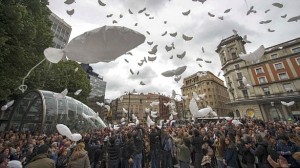
At the beginning of June, dozens of white dove-shaped balloons were released into the sky above the Basque city of Bilbao. The gesture was to mark the end of Gesto por la Paz, a platform of peaceful anti-ETA campaigners, who after 28 years believed their work had been done.
As a symbol of optimism and peace in the Basque Country it could hardly have been more striking. ETA has not killed on Spanish soil since 2009 and in October 2011, it declared a “definitive” end to a campaign of violence that started in the late 1960s.
And yet, the weeks both leading up to and since Gesto por la Paz’s closure have somehow cast doubt on the idea that the Basque Country is enjoying a new era of peace. And more worryingly, there has even been talk of a return to violence by ETA.
The evidence for these concerns cannot easily be brushed aside. A communiqué by the terrorist group in early May lambasted the government for not allowing a Basque peace process to advance. And on May 30, nationalist labour unions in the northern region staged a general strike against spending cuts – participation was patchy, but there were several violent incidents that were reminiscent of the ETA-inspired kale borroka of the old days.
Meanwhile, media reports suggested that Spain’s security forces had wildly differing views on the state of ETA, ranging from the commonly held view that it is dormant and harmless, to the notion that it is preparing to return to violence.
At the end of last month, a high court attorney even claimed the interior ministry had evidence that the lack of official negotiations with the terrorist organisation would “lead to a breakaway or a split [in it] and a return to armed activity.”
The government rejected that claim. But all the above developments, coupled with a distinct lack of tangible movement by the central government in the post-ETA era mean it’s easy to feel at best deflated, and at worst worried, about the Basque Country.
ETA’s frustration at the absence of a “peace process” is focused mainly on the prisoner issue. The group wants the government to make some basic concessions in this area as a response to the end of violence. Moving some of the 550 or so ETA members held in Spain to prisons closer to their families would be one such step; releasing prisoners who are ill or who have done three-quarters of their sentences would be another.
And yet, Prime Minister Mariano Rajoy cannot make those concessions without upsetting some of his key constituents. Anti-nationalist voters on the political right, terrorism victims’ groups and the right-wing media would all make the already unpopular Rajoy much more unpopular if he did.
So any moves intended to calm the disgruntled ETA would be extremely slow and subtle. Even many of those who are far from the political right would argue that a “peace process” as such is redundant anyway. ETA laid down its weapons because it was crippled by years of police infiltrations and arrests (this week, two more suspected terrorists were detained in Gipuzkoa). With only a few dozen active members, who are poorly organised and underfinanced, it can hardly dictate its terms. Its disbandment would seem the most obvious next step.
Within the izquierda abertzale – the Basque pro-independence left – there are suspicions that a lack of talks is based more on a desire by elements of the governing PP to allow the “Basque problem” to linger on for cynical political ends.
Given such a complex combination of pressures and ideologies, any progress is bound to be painfully slow.
But the Basque Country’s political landscape has changed almost beyond recognition in the last couple of years, with previously outlawed pro-independence radicals governing much of the region and giving a voice to those who once would have supported ETA. As Ireland has shown, there is always the threat of splinter groups and renegades. But the resurrection of ETA as an active force and the return of violence to the Basque Country (beyond the occasional burned-out car or ATM machine) simply don’t seem to be to anyone’s advantage.
Leave a Reply
You must be logged in to post a comment.